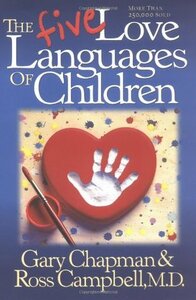Take a photo of a barcode or cover
I typically get pretty annoyed reading these self-help type books...the examples and case studies always seem way too contrived to me...but I actually really liked this one. I think for the most part as parents we all cover the 5 love languages to a point, but reading the book definitely made me more aware of what I do and how I could improve. By making small changes I have noticed some pretty big differences in the reactions of my kids, especially my girls. Definitely worth reading, although there are some cheesy examples :-)!
informative
inspiring
medium-paced
An important caveat: I do not read parenting books. In eight years of parenting and having probably read 500+ books in that time, I have read two. This is the second. I offer this as a warning that my review cannot be well informed in regards to the genre, only to my personal tastes and ideologies.
As a pastor I am often given the opportunity to offer premarital counseling and I have been using Gary Chapman’s “The 5 Love Languages” for years. His framework is easily understandable and offers rich ground for conversation and understanding between couples. I was first introduced to “The 5 Love Languages” when my partner and I entered marriage counseling and it has proven a useful framework in the years since. It was actually a conversation between us, in regards to our children (twin boys) that prompted me to pick up this book.
Our boys are eight and they are differentiating themselves and as parents we were discussing how and when to treat them the same and when and how to treat them differently because of their unique and particular behavior and needs. I hoped this book would provide additional insight and language for us as parents to discuss this framework of being in relationship with our children. I was disappointed. It was mostly the same content as the original and Chapman and Campbell took 210 pages to solidify their thesis which can be summed up as, “be sure to offer all the love languages to your children and pay attention as they grow and when you identify their primary language, be intentional about offering that demonstration of love too.”
For a reader unfamiliar with the 5 Love Languages this book would of course be much more informative. The book offered solid and thorough definitions of the languages and provided examples for each across ages which was helpful in relating these languages to my own children. I had hoped for more meat on the bones of these languages in the parent/child relationship. So, the book as a whole is okay. I do appreciate the insight this framework offers and the language it provides, the book itself simply did not offer me enough that was new as a parent. I would still recommend it if you aren’t familiar with the love languages as Chapman defines them.
Want more book content? Follow me at thebookwar.com
As a pastor I am often given the opportunity to offer premarital counseling and I have been using Gary Chapman’s “The 5 Love Languages” for years. His framework is easily understandable and offers rich ground for conversation and understanding between couples. I was first introduced to “The 5 Love Languages” when my partner and I entered marriage counseling and it has proven a useful framework in the years since. It was actually a conversation between us, in regards to our children (twin boys) that prompted me to pick up this book.
Our boys are eight and they are differentiating themselves and as parents we were discussing how and when to treat them the same and when and how to treat them differently because of their unique and particular behavior and needs. I hoped this book would provide additional insight and language for us as parents to discuss this framework of being in relationship with our children. I was disappointed. It was mostly the same content as the original and Chapman and Campbell took 210 pages to solidify their thesis which can be summed up as, “be sure to offer all the love languages to your children and pay attention as they grow and when you identify their primary language, be intentional about offering that demonstration of love too.”
For a reader unfamiliar with the 5 Love Languages this book would of course be much more informative. The book offered solid and thorough definitions of the languages and provided examples for each across ages which was helpful in relating these languages to my own children. I had hoped for more meat on the bones of these languages in the parent/child relationship. So, the book as a whole is okay. I do appreciate the insight this framework offers and the language it provides, the book itself simply did not offer me enough that was new as a parent. I would still recommend it if you aren’t familiar with the love languages as Chapman defines them.
Want more book content? Follow me at thebookwar.com
I read the original Five Love Languages so I initially thought I didn't need to read this version. I'm glad I did. Reading about The Five Love Languages has had a big impact on my parenting. I'd be careful who I recommended it to, though, because it Ross Campbell brings in a strong religious theme throughout the book (which I didn't mind) and a couple digs at working mothers (which I minded very much).
informative
inspiring
reflective
fast-paced
So a lot of this book is for older children and not for children under the age of 6. However there were a lot of good principles that I can begin to make into good habits now with my two toddlers. I am not one to think that every person fits into a category but I do appreciate that love is a language that needs to be learned and the various categories help one to love more fully and knowledgeably. The greatest lessons I learned from this book was that I need to be careful in how I discipline and to not use/twist a child's particular tendency for one type of love language against him or her. For example if a child craves physical touch, spanking is detrimental. Another lesson I learned was that it is healthy to have children express anger verbally and help them maturely move up the "ladder" of expressing anger. If not, the child will stay at a behavioral reaction level and later be very passive aggressive (which I see a lot in adults). But as parents we need to also practice and show the right ways to manage anger, which act is a powerful expression of love. I would recommend this book.
Probably not necessary to read if you've read the other Love Language book but it was a good refresher of the languages anyway.
Technically, I read half of the book and then skimmed the rest. Pretty repetitive but I have also heard of the love language concept before picking this up. So maybe that was just me.
Some parts are kind of laughable. I don’t believe any of the kid quotes from the book are word-for-word out of a kid’s mouth. I think they expanded on a kid’s short response if anything, and just tried to make it more thorough. I did like the quotes though. It’s good to take a second and try to imagine things from a kid’s perspective. (They are just written funny, like it’s by an adult is all haha)
I like the main concept of trying to understand what makes your child feel most loved. I think that’s something important to be aware of. I don’t agree that just because a child has the primary love language of physical touch and didn’t get enough shoulder rubs as child would be the main reason why someone would grow up, turn to drugs, and overdose as a young adult. Things are never that simple. And I think using examples like that can turn people off from the concept of love languages and not take it seriously. Sure, a couple more hugs could benefit just about anyone. I just think the way they use examples can be a bit far fetched.
I liked asking my oldest kid (age 5) some of the questions. It was interesting to see what he connects with love.
Overall, I think there are good points here. It is something to be aware of and consider. I also find some of their recommendations at the end of the chapters for each love language helpful. I don’t believe it’s an all-encompassing manual on loving your kids but it is a helpful concept to know.
Some parts are kind of laughable. I don’t believe any of the kid quotes from the book are word-for-word out of a kid’s mouth. I think they expanded on a kid’s short response if anything, and just tried to make it more thorough. I did like the quotes though. It’s good to take a second and try to imagine things from a kid’s perspective. (They are just written funny, like it’s by an adult is all haha)
I like the main concept of trying to understand what makes your child feel most loved. I think that’s something important to be aware of. I don’t agree that just because a child has the primary love language of physical touch and didn’t get enough shoulder rubs as child would be the main reason why someone would grow up, turn to drugs, and overdose as a young adult. Things are never that simple. And I think using examples like that can turn people off from the concept of love languages and not take it seriously. Sure, a couple more hugs could benefit just about anyone. I just think the way they use examples can be a bit far fetched.
I liked asking my oldest kid (age 5) some of the questions. It was interesting to see what he connects with love.
Overall, I think there are good points here. It is something to be aware of and consider. I also find some of their recommendations at the end of the chapters for each love language helpful. I don’t believe it’s an all-encompassing manual on loving your kids but it is a helpful concept to know.







